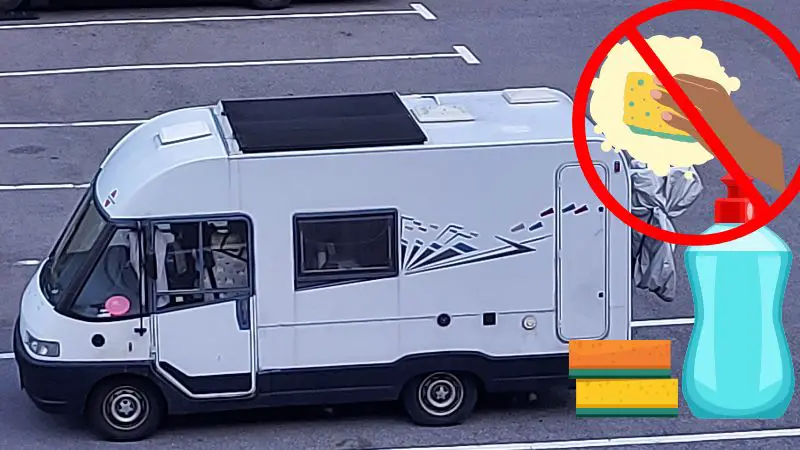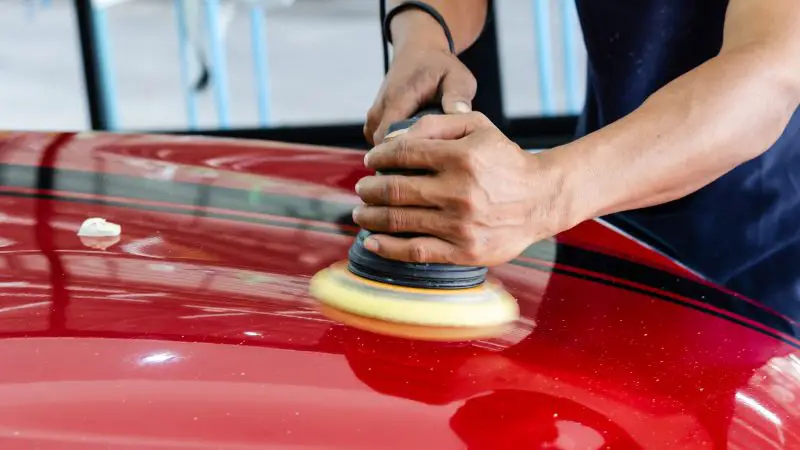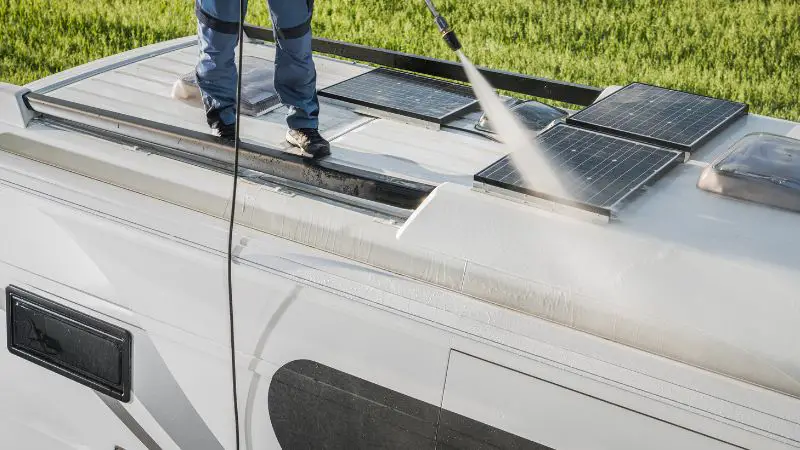This post contains affiliate links (I get a commission at no extra cost to you for purchases made through links in this post).

Cleaning your RV roof at least three to four times a year is recommended to maintain its optimal condition. If it’s time for you to clean your RV, can you use Dawn dish soap?
You should not use Dawn to wash your RV roof; it is a petroleum product and may void your RVs warranty. Dawn will also remove your RV roof’s protective coating and wax layer, making it susceptible to UV damage and fading. It can also damage the roof, especially if it’s made from rubber.
In this article, I’ll provide an in-depth explanation of why Dawn is bad for your RV roof. I’ll also discuss what to use instead of Dawn, whether or not you can pressure wash your RV roof, and some care and maintenance tips. Let’s get started!
Why Is Dawn Bad for My RV Roof?
Dawn is an inexpensive detergent and does a great job of cleaning dishes. However, it’s designed specifically for dish cleaning and not geared toward an RV roof. Here’s why it’s a bad idea to use it for your RV’s roof:
Dawn Can Remove the Coating and Wax on the RV’s Roof and Walls

As a dishwashing liquid, Dawn is formulated to strip grease from dishes effectively. As such, it can strip the waxy coating on your RV.
Although it’s a gentle cleaner with no phosphates, phthalates, or triclosan, it can still do a lot of harm to your RV’s roof if you use it regularly. Using it once or twice won’t lead to immediate damage, but you will need to put on a protectant and wax it again, which will be more expensive than using another soap.
Repeatedly using Dawn will eventually cause your RV’s protective coating to break down, making it prone to UV damage and fading from the sun. This means that the money you saved using Dawn to clean your RV’s roof will be nothing compared to the repair work you’ll need to do to address the sun damage.
Dawn Can Damage the Rubber on Your RV’s Roof
Many RV roofs are made from rubber. Rubber is further categorized into two main materials:
- TPO: Also known as thermoplastic polyolefin, this material comes from a blend of polypropylene or polyethylene and elastic ethylene copolymers. It’s the most common material for RV roofs. This lightweight and affordable material can last at least 15 to 20 years with proper care and maintenance.
- EPDM: A membrane rubber, ethylene propylene diene monomer is a mixture of carbons and plastics. Aside from being low maintenance, this material is known for being puncture-resistant, which makes it a good choice for RVs.
Both materials can be prone to damage when you use Dawn, which is known to contain petroleum distillates. These substances are essential in dishwashing as they remove grease effectively. However, they are also responsible for damage to your RV’s roof if you use Dawn to clean it.
Most RV roof manufacturers recommend avoiding using products containing petroleum distillates because even a small percentage can carry a risk, and they are potential corrosives. Hence, they can destroy latex resulting in swelling and the presence of uneven thickness. It may also void the warranty of your motorhome.
It may void the warranty of your motorhome!
Here are some of the dangers of using petroleum distillates on your RV’s roof:
- They can cause mass change or swelling, eventually damaging the roof’s surface.
- Adhesive loosening.
- Ballooning of the membrane.
- Voiding your RV roof’s warranty.
What To Use When Cleaning Your RV’s Roof
Now that you know using Dawn is a bad idea for your RV’s roof, what should you be using? Let’s take a look:
RV Cleaner
RV cleaner is always your best bet when cleaning your RV’s roof because it’s specially formulated for RVs. RV cleaners contain ingredients that the manufacturers have carefully studied and deemed safe for use on your RV, but if you want to use an all-purpose cleaner, I would recommend Simple Green.
| Type of Cleaner | Brand, Name & Amazon Affiliate Link |
|---|---|
| RV Roof Cleaner | Dicor Rubber RV Roof Cleanser Spray |
| RV Roof Cleaner EPDM Only! | Camco Rubber Roof Cleaner & Protectant |
| RV Cleaner | 303 RV Wash & Seal – Clean |
| All Purpose Cleaner | Simple Green |
Especially when it comes to RV cleaning products, many different types only work on certain materials, so it is very important that you know what kind of roof you have on your RV.
Some safe options that work on all RVs and roof types are listed above, except the Camco, as the protectant is not for TPO rubber roofs.
As there are 6 different RV roof types, and many of them look and feel the same, I have made a comprehensive guide on how to tell what type of RV roof you have as well as what products you can use with each roof type that you can find here.
It’s worth reading the label on the RV cleaner before using it and following the manufacturer’s recommendations. For instance, if it says you should wear gloves or goggles, be sure to do so. This is especially important if the cleaner contains strong chemicals that can be potential health hazards.
The video below from RV 101 explains how to clean your RV using RV cleaner:
Natural Cleaner
If you’re looking for an eco-friendly alternative for cleaning your RV’s roof, you can’t go wrong with natural materials. The good news is that you can often find them in your kitchen, and they are usually inexpensive. Also, many natural cleaners don’t typically contain harsh chemicals or abrasives that can damage the roof or put your health at risk.
An excellent option for your RV roof is a white vinegar and baking soda solution. Simply combine equal parts of each ingredient and apply it to your RV’s roof. Using a microfiber cloth, gently wipe the roof and rinse it off.
Natural cleaners work best when dealing with light stains or dirt. However, if you need to remove stubborn filth, using an RV cleaner with a stronger formula can be a better alternative.
Can I Use a Pressure Washer for Cleaning My RV Roof?

A pressure washer can make light work on particularly dirty surfaces, and you might wonder if you can use it on your RV’s roof.
You can pressure wash an RV roof if you take the proper safety precautions. When you pressure wash your RV roof, use a pressure washer with a low-pressure impact nozzle and avoid using the pressure washer on caulks, seals, vents, and hatches on the RV to prevent damage, that is how I do it.
Many people won’t recommend using a pressure washer on an RV. However, with the right precautions, I have done it a lot without any issues. But if you are more interested in those, you should check out my other article on exactly that.
Meanwhile, if you’re looking for an alternative to a pressure washer, you can use a sponge mop with a long handle. This way, you can work from a ladder, so you’ll avoid slipping on the roof.
The Importance of Cleaning Your RV’s Roof
Some people might think that because an RV’s roof isn’t visible, they don’t have to make much effort to keep it clean. However, cleaning your RV’s roof is essential for various reasons:
- It helps prevent rust. Keeping your RV’s roof clean and dry can help prevent corrosion and remove the dirt and moisture that causes it.
- It can prolong the roof’s lifespan. When your RV’s roof is continuously exposed to rain, dirt, ice, and dust, it can cause the rubber to deteriorate faster. Keeping it clean can help prevent this.
- It helps remove tree sap. Tree sap is soft when it falls on your RV’s roof but will soon harden and can even stain the roof if it’s left on for too long. Removing tree sap regularly can protect your roof from further damage.
- It can prevent mold and mildew build-up. A clean RV roof is less prone to developing mold and mildew, which can seep into your RV if left unchecked.
- It allows you to notice roof problems. When cleaning your RV, you are more likely to notice small issues with it and deal with insulation problems. This way, you can fix the problems before they become expensive and complicated to repair.
How to Care and Maintain Your RV’s Roof
Using suitable cleaning materials can help, but you need to do more. You need a proactive approach to keep the roof in its peak condition over time.
Below is a quick rundown of some of the best ways to protect your RV roof:
- Do not use cleaning materials with citrus ingredients, petroleum solvents, and abrasives. These can weaken the bonds in the roofing material, making them deteriorate over time.
- Reseal your RV roof at least once a year. Do this even when there are no apparent problems. The choice of sealant or coating should depend on the specific material of the roof.
- Keep your motorhome away from the sun and other elements that accelerate the damage. When parking your RV, pick a shady area while avoiding anything that could fall on the RV and cause dents.
- Invest in an RV cover. This is especially helpful if you’ll park your motorhome for an extended period.
- Inspect and clean the roof at least three times a year. Watch out for any damage that could potentially become more serious, and repair it as soon as possible. The longer you wait to act, the more significant the problem can be.
- Do not put too much pressure or weight on the roof. Consider the add-ons you’ll have, making sure they don’t exert unnecessary strain, especially if the roof is old
Conclusion
You should not use Dawn when cleaning your RV’s roof. It might be convenient and affordable, but this dishwashing soap can cause irreparable damage, especially for rubber roofs. Some of its ingredients can affect the surface. Instead, it’s best to use a cleaner specially formulated for RV cleaning, or if you are looking for an all-purpose option that you might have at home, go with Simple Green.
Check out these other articles I have made that I think you will find interesting too!
